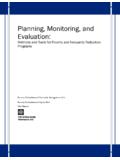Transcription of 6 Japan: A Story of Sustained Excellence - OECD.org
1 Japan: A Story of Sustained Excellence6 Strong PerformerS and SucceSSful reformerS in education: leSSonS from PiSa for the united StateS OECD 2010137 Japan has been at or near the top of the international rankings on education surveys since those surveys began. This chapter explores how Japan may have achieved this consistent standing and what other countries might be able to learn from the Japanese experience. The Japanese education system is grounded in a deep commitment to children that is concrete and enduring. The research also attributes Japan s success to a first-rate teaching force, superb family support for Japanese students at home, the way resources are focused on instruction and the strong incentives the system provides for students to take tough courses and study hard in school.
2 The school curriculum in Japan appears very coherent, carefully centred on core topics, with a clear goal of fostering deep conceptual understanding. The academic programme follows a logical sequence and is set at a very high level of cognitive challenge. Though it is applied nationwide, Japanese teachers have a remarkable level of autonomy in its application. The entire approach is aided by the shared belief that effort and not ability is what primarily explains student achievement. There is no tracking in Japanese schools, classes are heterogeneous and no student is held back or promoted on account of ability. The system has a great deal of inherent accountability to one s parents, one s peers and so on.
3 While entrance exams are deeply important for progression to Japanese higher education, the system of teacher accountability in schools is interestingly not based on student assessments. These, and many other factors, have combined to produce one of the world s best-educated and most productive : a Story of Sustained excellence138 OECD 2010 Strong PerformerS and SucceSSful reformerS in education: leSSonS from PiSa for the united StateS introductionthe performance of Japan s students in mathematics and science compared with those in the other oecd countries is impressive, and its comparative performance on the PiSa reading survey, though not in the very top ranks, is also impressive (table ).
4 There is nothing new about this consistently good performance; Japan has placed at or near the top of the international rankings on all such surveys since they seasoned observers report that average Japanese high school graduates who enter colleges compare favourably with average american college graduates in terms of what they know and what they can do. less generous observers suggest that they compare favourably to american college students with two years of college. other observers note that many Japanese high school graduates know more about the geography and history of many other countries than natives of those countries. Table s mean scores on reading, mathematics and science scales in piSaPISA 2000 PISA 2003 PISA 2006 PISA 2009mean scoremean scoremean scoremean scoreReading522498498520 Mathematics534523529 Science531539 Source: oecd (2010g), PISA 2009 Volume I, What Students Know and Can Do: Student Performance in Reading, Mathematics and Science, oecd 2 is tempting to believe that these comparisons are due to the achievement of only a small elite of students, but that is not the case 95% of the age cohort completes high school in Japan (figure ).
5 This has repercussions for daily life. newspaper articles in Japan routinely assume that their readers can understand sophisticated statistical tables and highly technical scientific topics. factory managers allocate manuals that assume knowledge of calculus to teams that include recent high school advantage of this level of knowledge and skill to a country, in both citizenship and economic terms, is incalculable. the question asked in this chapter is: how did they do it? and the corollary to that question is: What can other countries learn from Japan that might transcend any cultural differences?the JapaneSe education SyStem: hiStorical and Social contextJapan is a mountainous island nation.
6 The proportion of arable land to population is among the lowest in the industrialised world. its inhabitants crowd together in the mountain valleys and along the coasts in densely populated enclaves. Japan is also subject to regular frequent disasters such as typhoons and earthquakes, and the regular possibility of crop failure. and, finally, these islands contain very little in the way of readily extractable natural resources. instead, they have achieved a high level of success through their education long history in such a challenging environment has had a profound effect on Japanese culture; people developed very strong co-operative ties as a collective survival mechanism.
7 Society recognised early on that a lack of natural resources meant that the best way to succeed was through developing human capital. the result is a culture in which great value is placed on education and skills on the one hand, and on the group and social relations on the other. in Japan there is a shared belief that if the individual works tirelessly for the group, the group will reciprocate. But if one flouts the group, one can expect very little from society. Below we look briefly at how historical factors have shaped Japan s educational Tokugawa era: 1603 to 1868 Prior to the tokugawa era, Japanese culture had been a warrior culture. the Samurai had the highest social status in the nation for a long time.
8 During the tokugawa era, for about 250 years up until the middle of the 19th century, Japan was at peace. from the middle of the 19th century the Samurai, while retaining their social status, replaced their swords with pens to become the bureaucrats who ran the country. largely isolated from the outside world, Japan prospered and enjoyed a rich culture. By 1850, at least a quarter of the Japanese were literate, putting Japan about even with europe, although it lagged behind the europeans in technology and finance. 6 Japan: a Story of Sustained excellenceStrong PerformerS and SucceSSful reformerS in education: leSSonS from PiSa for the united StateS OECD 2010139towards the end of the tokugawa era, Japan s government was beset by endemic corruption and incompetence.
9 When the american admiral matthew Perry s Black Ships appeared in 1853, Japan was wholly unprepared to resist Perry s demands that Japan open for trade on terms favourable to the West. the tottering tokugawa regime was overthrown in 1868 by a rebellion led by lower-ranked bureaucrats rebelling against the incompetence of the dying regime. the emperor was restored to the throne in the meiji restoration. The Meiji Restoration: 1868 to 1912during an interview for this report, robert fish of the Japan Society described the leadership goals at the time of the meiji era:they were determined to do whatever was necessary to establish a relationship of equals with the Western nations that had entered and humiliated Japan.
10 The new government sent an enormous delegation to the Western nations to rewrite the unequal treaties that had been imposed on Japan. When nearly half of the leadership of the new government crossed the seas, they were astonished at what they saw. realising that advanced education, science and technology had made possible the industrial strength that had made the opening of Japan to the West possible, these Japanese officials came back to Japan determined to match the achievements of the West in education, science and technology and upgrade their military. (interview conducted for this report)With almost total consensus across leaders from all sectors, the Japanese determined to modernise their country in order to survive in the new world order.
















